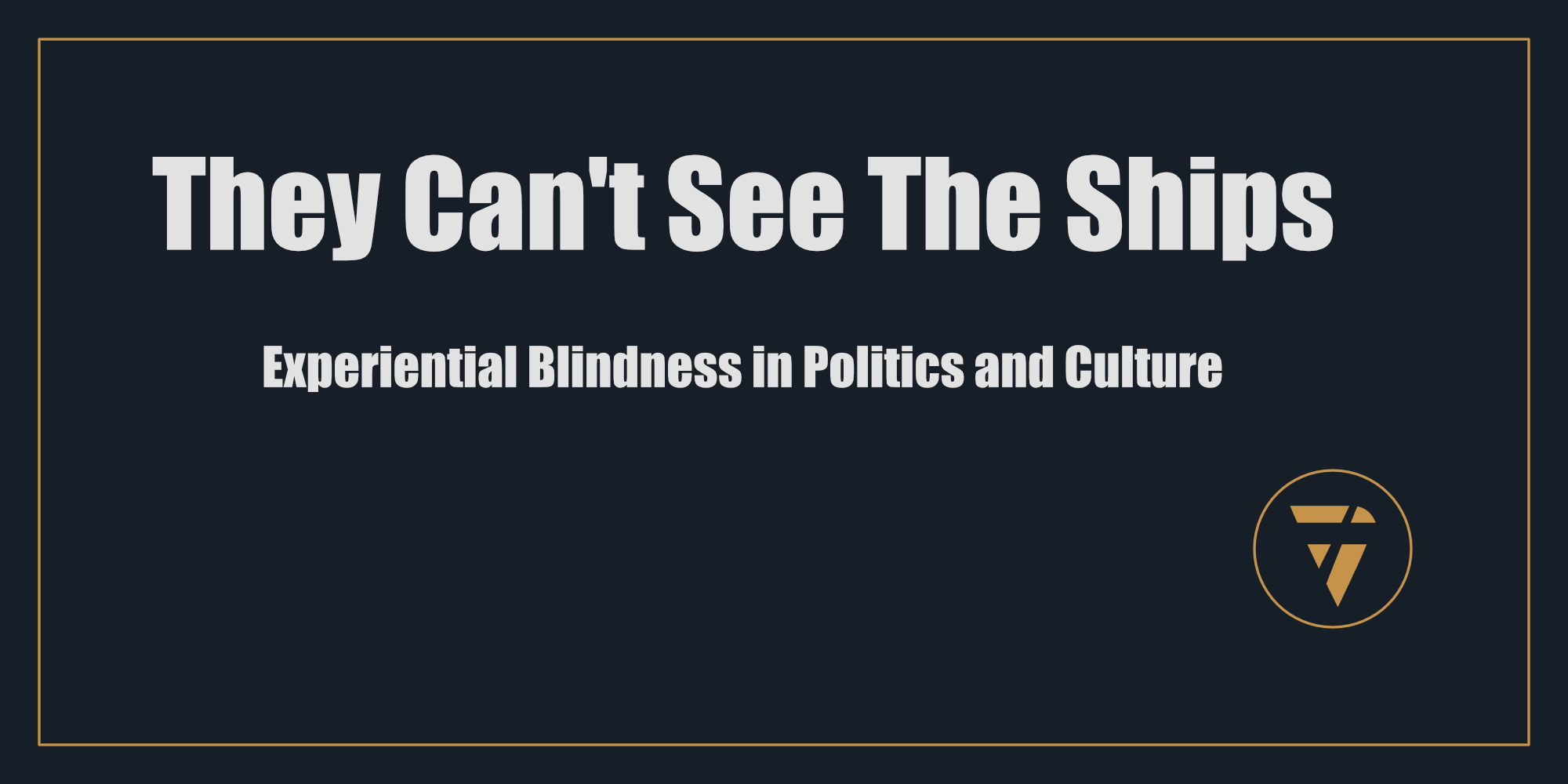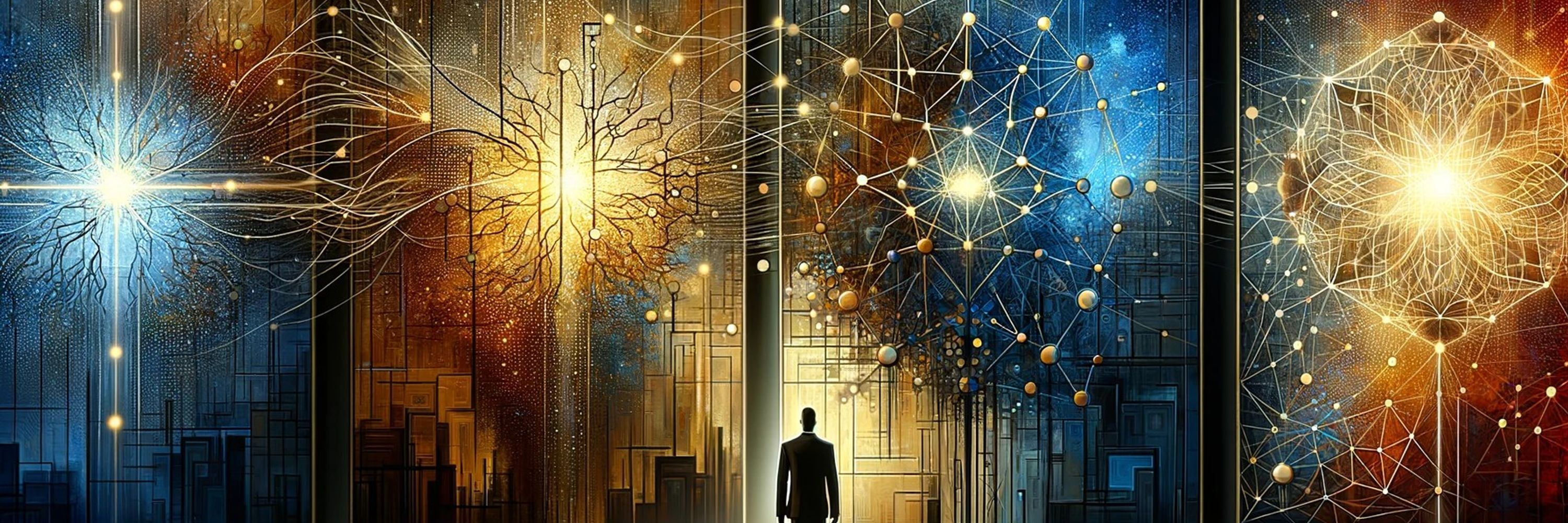They Can't See The Ships

Experiential Blindness in Politics and Culture
In the 15th and 16th centuries, as Spanish and English ships approached the shores of the Americas, there emerged a fascinating, almost mythological account: some indigenous people could not “see” the ships. Not because they lacked eyesight, but because the ships were beyond their frame of reference—beyond their written memory, their history, and their understanding of reality. This story, whether literal or allegorical, illustrates a profound phenomenon: experiential blindness.
When something appears in front of us that is so far outside our cognitive framework, we do not reject it outright—we simply fail to perceive it at all. It's as if it does not exist. Today, we are witnessing this same phenomenon, but in a vastly different context: the highest levels of government and the cultural elite in the United States.
The Ship of State Meets the Fog of Reality
In real time, a seismic shift is occurring in the structures of power, wealth, and influence, yet many of those within the corridors of Washington, D.C., and the mainstream political institutions cannot see it. They continue to operate within a framework of governance that assumes the mechanics of the system are functioning as they always have:
- That elections will be contested, but ultimately accepted.
- That laws will be debated, then enforced.
- That political figures will rise and fall within the expected limits of the system.
But something fundamental has changed. The Trump era, the rise of Elon Musk’s economic influence, the decentralization of media, and the fracturing of trust in traditional institutions have created a new power dynamic that the old guard simply cannot perceive.
They look out over the horizon and see only water, where a fleet of revolutionary forces is already started ashore.
Trump, Musk, and the Unseen Revolution
Donald Trump is not merely a political figure; he is a symbolic event. His presence, his rise, his survival, and his ongoing influence signify a disruption so great that many in the establishment still behave as if it is a temporary aberration. They speak of norms, institutions, and traditions as if invoking these words will restore them. They believe the ship of state can correct course, that justice and precedent will naturally realign, that the old ways will reassert themselves.
But this is not a phase. It's a paradigm shift.
Likewise, Elon Musk’s economic and technological power is not simply that of another billionaire. He is actively reshaping industries, communication platforms, and even geopolitical negotiations in a way that national governments used to control. Yet policymakers continue to treat him as just another CEO, failing to grasp that he operates more like a sovereign entity than a corporate executive.
The System as It Was vs. The System as It Is
Like the indigenous peoples who could not initially see the ships, the political class cannot yet process what is happening in front of them because they lack a framework for understanding:
- Decentralized Power: Traditional political authority was built on centralized control—media, finance, governance, and military might. Today, power is decentralized across digital networks, financial systems, and cultural influence, making government institutions weaker than ever.
- The Decline of Institutional Legitimacy: The judiciary, the intelligence community, the media, and even the military no longer carry the unquestioned authority they once did. Trust is eroded, and once that trust is gone, power is no longer real—it's simply an illusion waiting to be broken.
- The Illusion of Control: The old ways of managing political disruption—censorship, lawfare, economic sanctions—are proving ineffective against figures like Trump and Musk. These individuals operate outside the traditional levers of control, much like 16th-century European ships could maneuver faster, strike harder, and dominate in ways the indigenous societies had never encountered.
Why the Government is Speaking a Dead Language
Listen to the way legacy political figures speak:
- They talk about “rule of law” in a system where legal outcomes are now determined more by raw power than by jurisprudence.
- They speak of “protecting democracy” while their own actions undermine public trust in the institutions that sustain it.
- They warn of “misinformation” while their control over the narrative is slipping away daily.
This is not simply ideological blindness. This is experiential blindness. They are living in a world that no longer exists, unable to perceive the new rules of engagement.
Seeing the Ships: The Future of Power and Influence
Eventually, the indigenous societies did see the ships. But by the time they did, it was too late to prepare.
The same is happening now. Slowly, some within the establishment are beginning to recognize that their worldview is obsolete. Some are adapting, but many will be swept away, unable to adjust to a reality they did not anticipate.
The real question is not whether the system will change—it already has. The real question is: who will see it before it’s too late?
If you’re looking at the water and thinking nothing has changed, look again. The ships are already here.
This is what I’m working on. Tell me what you think, I enjoy the conversation! Subscribe and follow the work in real time.
Thanks!
B

They aren’t blind. They just can’t see it.
When the first ships arrived in the Americas, some indigenous people couldn't process what they were looking at. No frame of reference—no recognition.
That’s the US today. The system has already changed. They just don’t know it yet.
PS -






